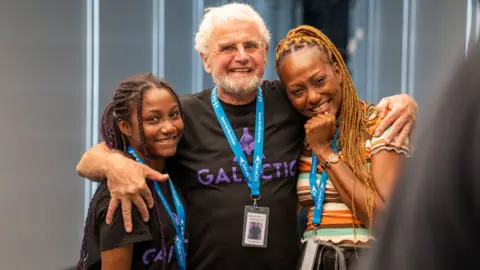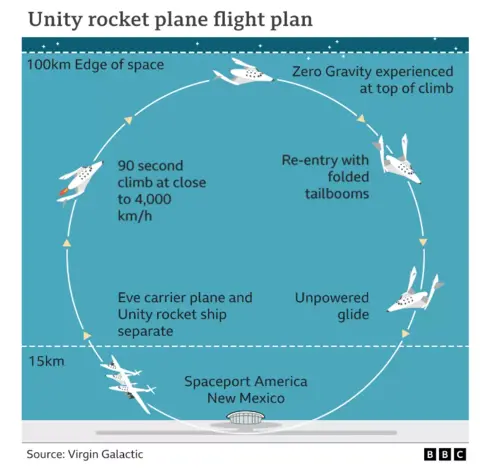Virgin Galactic: First space tourism mission after decades of promises
 Virgin Galactic
Virgin GalacticVirgin Galactic has taken a former Olympian, a University of Aberdeen student and her mother to the edge of space on its first flight for tourists.
Ana Mayers, 18, and her mother Keisha Schahaff, 46, both from Antigua, won their tickets in a competition.
They became the first mother-daughter duo to fly to space together.
Jon Goodwin, from Newcastle-under-Lyme, became the second person with Parkinson's disease to go to space, a trip he called "completely surreal".
Mr Goodwin bought his ticket for $250,000 (then £191,000) in 2005.
The carrier mothership VMS Eve took off from Spaceport America, in the state of New Mexico, at 08:30 local time (15:30 BST).
Fifty minutes into the flight, the Unity rocket ship separated from Eve as planned.
A short time later, the passengers were given the all-clear to unbuckle and enjoy zero gravity, at an altitude of around 85km (280,000ft).
Ms Mayers, a second-year philosophy and physics student at the University of Aberdeen, immediately reached for the window to take in the views of Earth and the black of space.
The three then returned to their seats and strapped themselves back in ahead of the return journey.
They successfully landed back at Spaceport America just over an hour after taking off.

Speaking at a press conference after the flight, Ms Schahaff - who won the prize while flying to the UK to visit her daughter in Scotland - said she was still "up there" following the experience.
"Looking at Earth was the most amazing" part of the trip, she said.
Mr Goodwin described his experience as the most exciting day of his life.
Despite being diagnosed with Parkinson's several years ago, he was given the all-clear to fly.
"I'm hoping that I instil in other people around the world, as well as people with Parkinson's, that it doesn't stop you doing things that's out of the normal if you've got some illness," he said.
"The most impressive thing was looking at Earth from space - the pure clarity was very moving."
In a video posted on social media, Sir Richard Branson - Virgin Galactic's founder - shed tears of joy as he celebrated the mission from Ms Schahaff and Ms Mayers' native Antigua.
Sir Richard, who completed a similar trip in July 2021, wrote: "Today we flew three incredible private passengers to space: Keisha Schahaff, Anastatia Mayers and Jon Goodwin.
"Congratulations Virgin Galactic commercial astronauts 011, 012 and 013 - welcome to the club!"
Mr Goodwin was the first on a list of 800 or so individuals who have bought tickets for a ride on the Unity rocket.
Some of them - including Mr Goodwin - have been waiting over a decade to get their chance, and most still face a long wait.
Sir Richard first announced his intention to make a space plane in 2004, with the belief he could start a commercial service by 2007.
But technical difficulties - including a fatal crash during a development flight in 2014 - have made the space project one of the most challenging ventures of his career.
Recently, Amazon CEO Jeff Bezos' space company Blue Origin beat Virgin Galactic in the race to become the first company to take paying passengers into space.
Both companies say their missions further science as well as catering to the very rich.
But, space tourism has been criticised for its cost and environmental impact.
